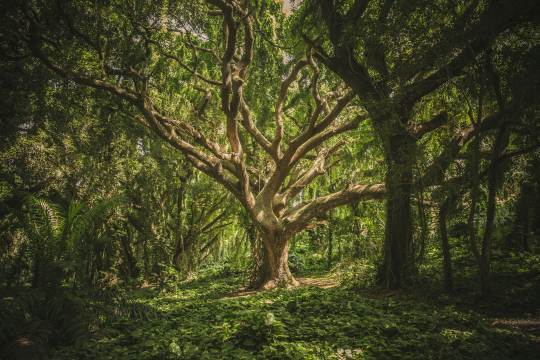Researchers have challenged the Nigerian traditional approach to managing sacred forests, stating that conserving the forests only for cultural purposes lacks sustainability in the face of cultural shifts and economic developments.
In many parts of Nigeria, sacred forests are preserved primarily by indigenous traditional beliefs and practices for cultural and religious purposes. The forests serve as abodes for ancestral deities and symbols of cultural heritage and support traditional practices like masquerade performances. However, the sacred forests are currently facing existential threats due to degradation.
A recent study conducted in Enugu, a state in the eastern part of Nigeria, has shed new light on the conservation of sacred forests. The findings challenge the prevailing notion that cultural value alone is sufficient to protect sacred forests.
Material values could help save forests
The study found that people's perceptions and relationships to sacred forests are shifting from non-material to material value, such as medicinal value and ecotourism, due to the gradual loss of indigenous knowledge and diminishing regard for culture.
It observed that many young people are less inclined to preserving sacred forests because they have abandoned the traditional customs and rituals that have preserved the forests in preference to the Christian faith. However, their attitude could change if the forests could play a more significant role in supporting people's livelihoods.
The researchers argue that the sole emphasis on cultural value for the conservation of sacred forests has diminished people's interest, paving the way for uncontrolled encroachment, hunting, and logging of woods in the forests.
The study, titled Integrating Biocultural Conservation and Sociocultural Valuation in the Management of Sacred Forests: What Values are Important to the Public? proposes a more comprehensive approach that considers a range of values like medicinal, ecotourism, environmental, bequest, existence, and social value as a reason for preserving the sacred forests.
Sacred forests must be useful to different people
It said that preserving sacred forests because of the other values they offer would inspire effective conservation from different members of society and mobilize public support against deforestation and illegal logging.
Eberechukwu Johnpaul Ihemezie, an EfD Nigeria researcher who led the study, urged stakeholders and policymakers to adopt a more inclusive and adaptive strategy in sacred forest conservation.
"Sacred forests are crucial parts of the ecosystem. Adopting a plural approach to conservation will ensure their long-term viability in the face of cultural changes and economic progress," Eberechukwu Johnpaul Ihemezie said.
